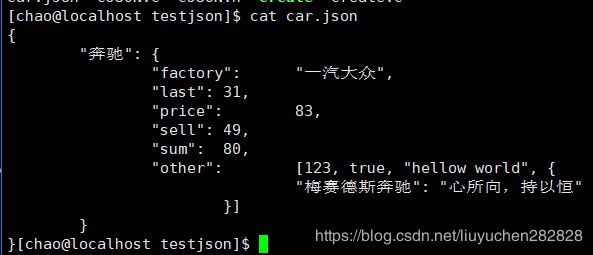json格式与cJSON函数库
json的格式
- 键/值对 key:value,用半角冒号分割
- 文档对象 JSON对象写在花括号中,可以包含多个键/值对。
- 数组 JSON 数组在方括号中书写: 数组成员可以是对象,值,也可以是数组(只要有意义)。
{ "stars":[ { "name":"Faye" ,"address":"北京" }, { "name":"andy" ,"address":"香港" }, { "name":"eddie","address":"台湾" }, ] }
json数组
char array[23] = " safasdfsdaf";中括号[整型,字符串,布尔类型,json数组,json对象],数据类型可以不一样
json对象
{}中是一些键值对- 例如:
{ "name1": "zhang3" ,
"name2": "li4"
}
- key值:必须是字符串,不重复,key值是搜索唯一的标识
- value值:json对象,json数组,布尔,整型,字符串
json数组+json对象
{ "name1": "zhang3" ,
"name2": "li4" ,
"张三" : {
"别名" : "老王",
"性别" : "男" ,
"年龄" : 34,
"孩子" : ["小红","小绿","小黑"]
}
}
cJson结构体
/* cJSON Types: */
#define cJSON_Invalid (0)
#define cJSON_False (1 << 0)
#define cJSON_True (1 << 1)
#define cJSON_NULL (1 << 2)
#define cJSON_Number (1 << 3)
#define cJSON_String (1 << 4)
#define cJSON_Array (1 << 5)
#define cJSON_Object (1 << 6)
#define cJSON_Raw (1 << 7) /* raw json */
#define cJSON_IsReference 256
#define cJSON_StringIsConst 512
/* The cJSON structure: */
typedef struct cJSON
{
/* next/prev allow you to walk array/object chains. Alternatively, use GetArraySize/GetArrayItem/GetObjectItem */
struct cJSON *next;
struct cJSON *prev;
/* An array or object item will have a child pointer pointing to a chain of the items in the array/object. */
struct cJSON *child;
/* The type of the item, as above. */
int type;
/* The item's string, if type==cJSON_String and type == cJSON_Raw */
char *valuestring;
/* The item's number, if type==cJSON_Number */
int valueint;
/* The item's number, if type==cJSON_Number */
double valuedouble;
/* The item's name string, if this item is the child of, or is in the list of subitems of an object. */
char *string;
} cJSON;
typedef struct cJSON_Hooks
{
void *(*malloc_fn)(size_t sz);
void (*free_fn)(void *ptr);
} cJSON_Hooks;
cjson
创建一个json对象
cJson * cJson_CreateObject(void);
往json对象中添加数据成员
void cJson_AddltemToObject(
cJson *object, //json对象
cosnt char *string, //key值
cJson *item //value值(int,string,array,obj)
);
从缓冲区中解析出JSON结构
extern cJSON *cJSON_Parse(const char *value);
解析一块JSON数据返回cJSON结构,在使用完之后调用cJSON_Delete函数释 放json对象结构
将传入的JSON结构转化为字符串
extern char *cJSON_Print(cJSON *item);
(可用于输出到输出设备),使用完之后free(char *);
- 返回值需要free释放
- FILE * fp=fopen();
- fwrite();
- fclose();
将JSON结构所占用的数据空间释放
void cJSON_Delete(cJSON *c)
创建一个值类型的数据
extern cJSON *cJSON_CreateNumber(double num);
extern cJSON *cJSON_CreateString(const char *string);
extern cJSON *cJSON_CreateArray(void);
创建一个对象(文档)
extern cJSON *cJSON_CreateObject(void);
数组创建以及添加
cJSON *cJSON_CreateIntArray(const int *numbers,int count);
void cJSON_AddItemToArray(cJSON *array, cJSON *item);
json嵌套
向对象中增加键值对
cJSON_AddItemToObject(root, "rows", 值类型数据相关函数());
向对象中增加数组
cJSON_AddItemToObject(root, "rows", cJSON_CreateArray());
向数组中增加对象
cJSON_AddItemToArray(rows, cJSON_CreateObject());
解析json文件
将字符串解析为JSON结构
cJSON* cJSON_Parse(cosnt char * value);
//返回值需要使用cJSON_Delete释放
根据键值查找json结点
cJSON * cJSON_GetObjectltem(
cJSON* object, //当前json对象
const char * string //key值
);
获取json数组中元素的个数
int cJSON_GetArraySize(cJSON* array);
根据数组下标找到对应的数组元素
cJSON* cJSON_GetArrayltem(cJSON* attay,int index);
判断是否有可以值对应的键值对
int cJSON_HasObjectltem(cJSON* object,const char* string);
c语言调用cJSON函数库创建json文件
示例
#include